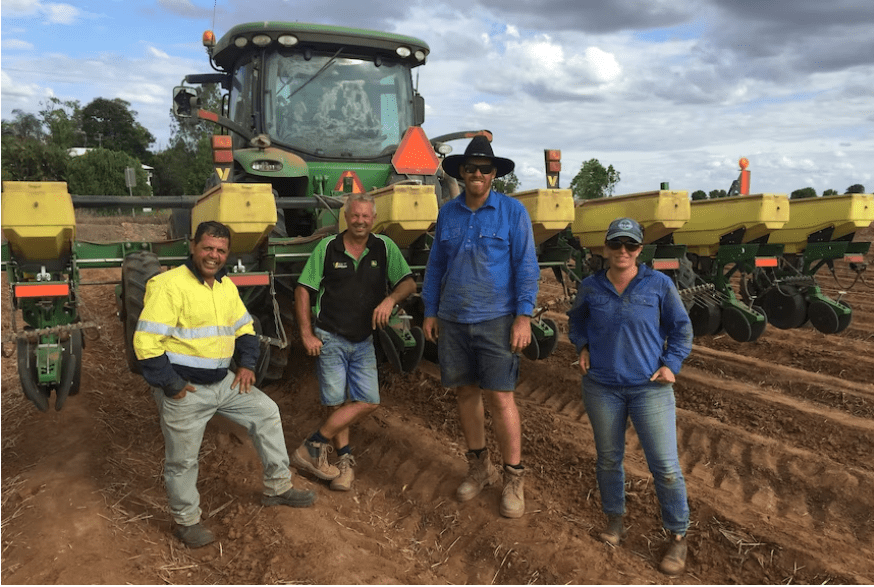
CQU Associate Professor Surya Bhattarai, RDO Australia’s Richard Weston, Emerald farmer Aaron Kiely, and CQU’s Dr Tieneke Trotter. Photo: CQU
PRODUCERS across Northern Australian might soon be able to take three bites of the proverbial peanut, with grain-and-graze trials delivering promising results for a new multi-purpose production system.
Preliminary results from the Grain and Graze North project, led by CQUniversity in partnership with the Peanut Farming Services team at Bega Group (Bega) and principal co-investment from the CRC for Developing Northern Australia (CRCNA), indicate that peanuts can provide up to one tonne per hectare of biomass for cattle fodder without significantly compromising end-of-season nut yields.
Detailed results from the project’s first year of trials will be presented to farmers and agronomists at a series of field days to be held over coming months at the five Queensland trial sites located in Emerald, Ayr, Tully and Georgetown, and Katherine in the Northern Territory.
Option for diversified revenue
Lead researcher Tieneke Trotter said if successful, the concept would open the way for farmers and graziers to diversify their revenue streams by producing the crop for nut markets, as well as harvesting biomass for livestock fodder both during and at the end of the growing season.
“Peanuts have been identified by the CRCNA as a priority crop for expanded production in Northern Australia and this project is testing the potential for high biomass varieties to: produce high-value fodder for diversification of farm businesses; provide feed security from extended dry seasons; and, potentially finish stock for sale into higher value markets, all while still delivering a valuable crop of nuts at the end of the season,” Dr Trotter said.
“So far we’ve found that while nut yield can be lower in plots that were cut for hay, the yield loss was not as large as producers might expect.
“In some cases, the nut yield was not impacted at all, or occasionally an improvement in yield was noted. The peanut plants recovered well after the in-season biomass cut, and they typically produced similar amounts of dry matter as the uncut plots at the end of the season of approximately 2t/ha.”
The peanut yields ranged between approximately 0.5t/ha and 4t/ha for varieties that were cut, and approximately 1-6t/ha for plots that were not cut.
The results will inform future economic analysis of the cost and benefit of a fodder-plus-nut crop versus nut-only production.
“More research is needed into how to minimise the yield discrepancies, and why the performance of varieties varied so greatly between trial sites, which we believe was due to cold temperatures throughout the growing season in North Queensland resulting in a lower than expected biomass and nut yield at those sites.”
Varieties under assessment
The findings from 2022 also informed the varietal selection for the 2023 trials, as well as planned adaptations to agronomic practices such as the timing of cutting in-season biomass in order to maximise production.
“We anticipate better outcomes from the 2023 trial as we implement what we are learning,” Dr Trotter said.
“The two major lines being grown across northern Australia in the 2023 season are Alloway and Kairi, but there will also be further investigation of two minor lines which may be more suited to some conditions, with another variety to be trialled in Katherine and one in the Burdekin.”
Bega’s peanuts breeding and seed manager Dan O’Connor said he was encouraged by the first year of trial work and expected improvements in crop yield over year two and three of the project.
“With planting commencing on time this season and good growing conditions throughout the season, we would expect yields to improve significantly in 2023,” Mr O’Connor said.
“Peanut is a high-value fodder product and the potential for multiple crop uses in one crop cycle is a very exciting development that may encourage new growers to look at peanut as a cropping option,” Mr O’Connor said.
The Grain and Graze North research activities are being conducted in partnership with farmers, Qld’s Department of Agriculture and Fisheries, the NT Department of Industry Tourism and Trade, TRAP Services Tully, the Burdekin Bowen Floodplain Management Advisory Committee, the Central Highlands Development Corporation, Rockhampton Regional Council, the Central Highlands Cotton Growers and Irrigators Association, RDO Australia, and AgForce Queensland.
Field days scheduled
The dual-purpose peanut trials will be showcased, along with the research into high-value spice crops and new mungbean varietal assessments, at a research field day to be held on April 19 at Aaron and Carly Kiely’s property Deneliza Downs, 5km east of Emerald on the Capricorn Highway.
Dates will soon be announced for field days in Georgetown in late April, Ayr and Tully in May, and Katherine in June.

HAVE YOUR SAY